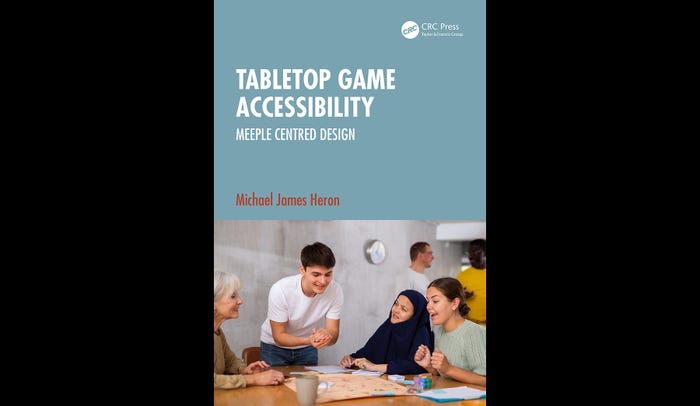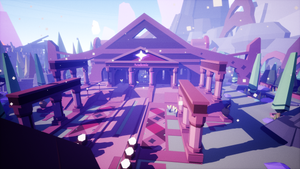Opinion: The dark allure of We. The Revolution
Columnist Katherine Cross examines We. The Revolution, a gorgeous strategy-simulation game from Polish studio Polyslash that puts players in the role of a Revolutionary Tribunal during the French Revolution.

Time was running out in the great game of Expo Hall wanderings. Twenty minutes before the hall closed on the final day of PAX West I was stopped in my tracks by a game with grim allure: We. The Revolution.
The brainchild of Polish outfit Polyslash, the title sees you take the role of a judge at the height of the French Revolution. An alcoholic gambler with an eye for intrigue, your judge sits on the Revolutionary Tribunal, trying the cases of the day as Paris roils around your courtroom. The game, a bloody and politically savvy Phoenix Wright from the other side of the bench, sees you meting out justice while also managing your standing among the various factions that strive for control of the new France.
Your judge is, in short, a self-consciously political actor, weighing the demands of the masses, the Revolutionaries, and the “enlightened” faction leaders when trying your cases. Making space for the truth is one of the great challenges of the game, but you will inevitably succumb to the corrupting needs of politics not long after you design your own unique seal. As you stamp your judgments, you move the needle of public (and private) opinion one way or another, hoping to stave off your own execution at the hands of Robespierre or an angry mob.

You shift between the courtroom, your home (which is alive with its own tensions), and a strategic map of the city where you can dispatch your agents to help you secure influence in key arrondissements. It evokes the same feel, interestingly enough, as Hanako Games’ Long Live the Queen--which is a visual-novel-as-bullet-hell in balancing its various statistical demands and opaque choices. In We. The Revolution you’re balancing a variety of meters, mostly gauging different types of opinion—up to and including the opinion of your jury—and it’s sometimes blissfully unclear what does what.
This can be irritating in one light, but in another it aptly simulates the irrational whims of the crowd, and it creates a strange, perhaps apposite, gambler’s dynamic where you have to learn to quit while you’re ahead. Do you declare your verdict once the jury is convinced of the decision you wish to render? Or do you push forward with more inquiries in the hopes of winning over a different faction at the same time?
The fetching polygonal art lends the game an immediately recognizable style and it all evokes the dusty, dim, smoke-filled salons and powdery halls of the period.
***

The game aches with tension and each decision is a lead weight of meaning. In spite of the sheer number of things going on, nothing feels truly wasted. It’s a reminder that efficient game design needn’t always be a model of minimalism and simplicity.
Arrayed before you are a series of case files, which can include medical documents, witness statements, and more. Keywords in each pop out like hyperlinks in a Twine game or visual novel, and clicking on them adds key concepts to a wheel where you then link keywords to form questions. In this way, you can query the defendant, and potential witnesses.
"..the machinations of running a state [lend] themselves well to the cause and effect systems that propel so much game design. They all express that elusive, almost Platonic dream: that government can be made just as rational as a perfectly ordered system."
Asking questions isn’t always the way to the truth, however. This is, after all, a courtroom that boils with revolutionary fervour. The gallery is filled with protesting citizens who hurl imprecations like football hooligans, for or against the defendant. Naturally, the defendant knows this and plays to the crowd. Your questions are, to indulge a different sport metaphor, pitches to a batter. Throw the wrong kind, and your obviously-guilty defendant can hit a home run--winning both the jury and the mob.
Of course, maybe you want them to because you need the peasants on your side for your next political maneuver. And, of course, you have to factor this in to your forthcoming decision about whether to authorize the guard to use deadly force in stopping the riots that plague the city.
It’s these layers of insidiousness that make this game darkly delicious.
***
Government simulators are a common enough genre in gaming. From strategy games like Civilization or Crusader Kings, to the early viral browser hit NationStates, to SimCity’s grand oeuvre, to election simulators like The Political Machine series, the machinations of running a state lent themselves well to the cause and effect systems that propel so much game design. They all express that elusive, almost Platonic dream: that government can be made just as rational as a perfectly ordered system.
We. The Revolution bows to that necessity in its way; code is code. But it digs deeper than just about all the aforementioned games by exploring the power of one person in that system, from the level of the intimately irrational. Effect follows cause with a drunken stagger here, and that feels oddly satisfying. The law of unforeseen consequences is, after all, the only truly certain thing in politics.
Rational systems can, through sheer complexity, capture that sense to a certain degree; what you do in the Classical Era in Civ may have severe, game-changing knock on effects in the Information Era, for instance. But We. The Revolution dwells in one very specific era, and one specific place, so chaotic that it couldn’t even agree how to measure the tense passage of its time. The unforeseen consequences of your actions, then, unfold in something like real time.
We. The Revolution’s art takes its inspiration from the Cubism movement, according to game director Dawid Cislak. That’s evident enough in the distinct polygon style. But I’d say it’s not the, frankly, naturalistic art that’s truly Cubist. Cubism was about the explosion of perspective, allowing you to see all sides of an object from a single point of view. We. The Revolution does this not through its art, but through its mood and medium; from the vantage point of something like a visual novel, we get far more emotional depth and meaningful maturity than we do from so many splashy, big budget operations.
In short, you can see every angle on a nation’s pain from your bench. The angle you choose to emphasize is what this game is all about.
About the Author(s)
You May Also Like













